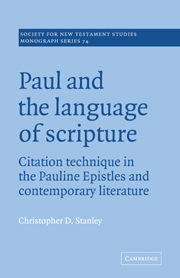 Paul and the Language of Scripture
Paul and the Language of Scripture 2 - A question of method
Published online by Cambridge University Press: 05 November 2011
Summary
The importance of methodology
Surely the most vexing problem that confronts any attempt to analyze the citation technique of the apostle Paul concerns how one can know where Paul has adapted the wording of the biblical text and where he has simply reproduced the wording of a non-“standard” Vorlage. It comes therefore as something of a surprise to discover how little attention has been paid to this key question in the standard examinations of Paul's use of Scripture. In fact, a careful review of available studies turns up not one significant discussion of the thorny methodological issues raised by this perennial crux. For the most part investigators have been content to compare the wording of the Pauline text with the standard editions of the Greek and Hebrew Bibles (the more astute include references to the critical apparatus) and then to offer a few perfunctory remarks as to why this or that reading should or should not be attributed to the apostle Paul. Questions such as what constitutes reliable criteria for adjudicating such matters have been largely ignored. As a result, one finds almost no guidance in the literature on such vital subjects as: how to distinguish between intentional adaptations and other forms of textual variation, such as arise from memory quotation or the use of a different Vorlage; what types of modifications Paul typically introduces into the wording of his citations; how Paul's handling of the biblical text compares with the approaches of his contemporaries; and similar matters.
- Type
- Chapter
- Information
- Paul and the Language of ScriptureCitation Technique in the Pauline Epistles and Contemporary Literature, pp. 31 - 62Publisher: Cambridge University PressPrint publication year: 1992


